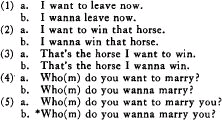Published online by Cambridge University Press: 27 June 2016
All treatments of so-called to-contraction in English (Lakoff (1970), Bresnan (1971), Lightfoot (1976)) attempt to deal with this phenomenon entirely in terms of contiguity. The purpose of this squib is to point out that the major constraint on this phenomenon is rather one of subject coreference, and furthermore that this coreference condition is identical to that for a universal rule which I have called ‘equi-subject clause union’ (Frantz 1976).
To illustrate, I will reconsider typical examples cited in discussions of this phenomenon, pointing out the relevance of coreference. 
This is a slightly revised version of a paper by the same title which appeared in Daly (1977). I am indebted to Paul Postal for pointing out serious inadequacies in a much different earlier version of this paper. Of course, he is not responsible for any remaining inadequacies.